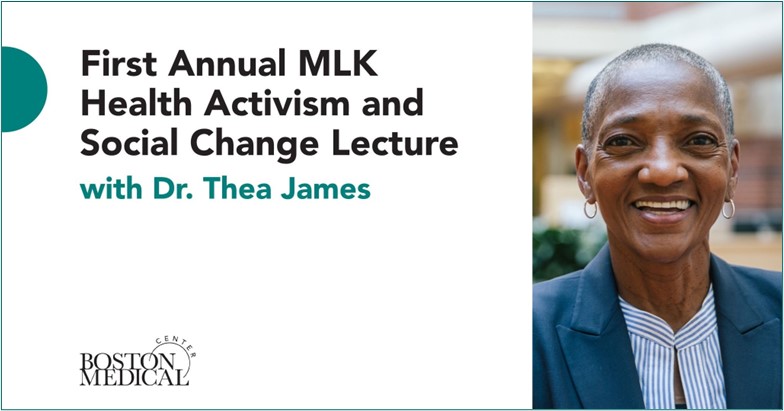Dr. Thea James of BMC Lauds Health Equity Changes at Inaugural MLK Lecture

Watch the recording by clicking the link at the bottom of this page and entering passcode: +b#3$J?h
Dr. Thea James of Boston Medical Center, an H2HC member, recently delivered the inaugural MLK Health Activism and Social Change Lecture. In her lecture, she said that health care inequities and inequalities can be addressed by challenging preconceived ideas, having a plan that addresses root causes, and involving the community in solutions.
“Our patients have busy, complicated lives and I think medicine is built for medicine. It’s not necessarily built for the people we serve. For them, time is a luxury, when they have other things they must prioritize before coming to the hospital,” James said at the Jan. 23 virtual lecture, hosted by the Diversity & Inclusion office.
That is particularly true for the population served by Boston Medical Center (BMC), the School’s primary teaching affiliate and the largest safety net hospital in New England with 65 percent of its patients identifying as nonwhite, many residing in the surrounding neighborhoods that include some of the region’s most underrepresented and underserved populations. BMC data showed racial health inequities in Boston that included Blacks having 2.5 times the rate of prostate cancer as whites; 1.8 times the suicide rate and are 50 times more likely to die by gunfire. Infant mortality among Hispanics was 3.4 times that of whites; diabetes mortality 1.6 times, and Hispanics had over twice the rate of COVID-19 infection.
“People are able to create entire careers…on uncovering disparities without it being connected to a plan, an intentionality to eliminate them,” said James, who also is BMC’s vice president of mission and co-director of its Health Equity Accelerator, an innovative approach to attacking healthcare inequities using data analysis, community engagement, and focused multidisciplinary teams that look for novel solutions that can be enacted quickly.
The inequities and inequalities laid bare by the pandemic, combined with the success of addressing vaccine hesitancy through research and outreach, prompted a hospital-wide self-examination that led to the development of the Health Equity Accelerator in 2022.
It was a call to action not just for COVID-19 but on endemic health issues like cancer, diabetes, pregnancy, behavioral health. More than 80 BMC physicians, administrators and staff worked out various approaches to health equity, considering more than 100 analyses of baseline patient data to understand the main drivers of these inequities. In-depth patient interviews helped inform strategic planning and a prioritized list of 60 targeted areas where progress needed to occur over the next year to two years.
James used the example of preeclampsia, high blood pressure that develops during pregnancy and can damage maternal organs, restrict fetal development and cause pre-term births. BMC data showed 1.7 times the rate of severe complications during birth among Black patients than white patients that included a disparity in post-partum hemorrhaging, a serious and potentially fatal condition for the mother. Black mothers were 1.5 times more likely to develop severe maternal morbidity and 1.9 times more likely to deliver babies small for their gestational age.
“This was the first time we were interrogating that data, not just accepting that disparity but interrogating it to understand the root cause,” said James.
With a goal of reducing the complications from high blood pressure and optimizing the timing of delivery of the baby to offset preeclampsia impacts, BMC utilized the Health Equity Accelerator and developed a plan involving significant patient input over the past year. It included expanded patient outreach like multilingual education and a “Chatbot Hub” texting service to handle questions; an expansion of Birth Sisters, a multilingual program of people trained to assist mothers during pregnancy and first-year care; at-home monitoring and self-reporting blood pressure and glucose levels; and work by the hospital to address racism at the clinical level.
The Health Equity Accelerator is an example of a changing attitude among both patients and caregivers, a lesson learned during the pandemic, James said.
“Expectations are not what they used to be. The bar is really high,” said James. “People want to hear the truth. People don’t want to hear about things that are going to make us feel better when it hasn’t done anything to change the state of things.”
Watch the recording by clicking the link below and entering passcode: +b#3$J?h
